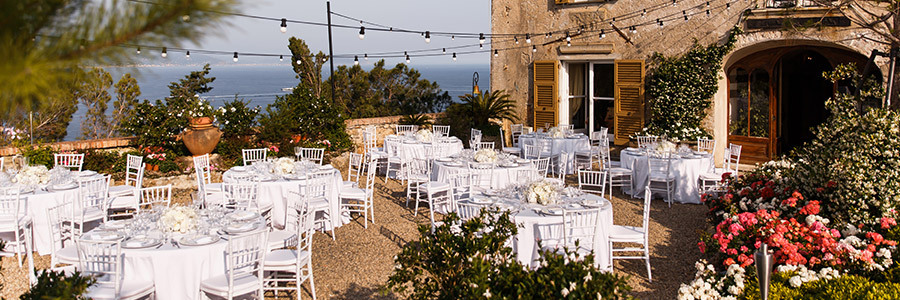Free Wedding Venue Business Plan PDF [2025 Template + Sample Plan]

10 min. read
Updated February 7, 2025
With couples nationwide ready to tie to knot after pandemic delays, the next few years could be a boom time for weddings. 2021 saw 1,934,982 weddings in the US alone, at an average cost of $27,063 per wedding. Whether you’ve been wanting to start a wedding venue as your primary business or a side hustle, writing a wedding venue business plan can help you say “I do” to your startup.
How to write a wedding venue business plan
Like the perfect wedding speech, your business plan is just long enough to do what it needs to do, but short enough so you can get on with the good stuff. That’s why we recommend using the one-page plan format to cover all of the necessary information to build a wedding venue business.
As you plan your wedding venue business, here are a few things to keep in mind that can help you become a business newlywed on a path to success.
1. Outline the basics about your wedding venue’s location, proximity, and offerings
As a wedding venue, location is everything. Your goal is simple: Understand what will compel people to hold their special day at your special place, and what makes your location a good site logistically.
Here are a few questions to help you nail down the value your site presents to customers:
- What sort of property is the venue? Is it urban, small town, or rural?
- Is space available for the ceremony only, or for the reception too?
- Is lodging available on-site or nearby?
- What sort of dining and refreshment options are offered in-house? Or, how easy is it for a third-party caterer to set up and run prep, service, and cleanup operations?
- Outdoor, indoor, or options for both?
- Are there other activities that can be part of the venue or your wedding package options, such as flower picking, wine tasting, or golf?
- How will people get there? What highways, airports, and/or train stations is your venue close to? How many vehicles can park on-site, and how many people can the venue legally hold?
Knowing what you don’t offer can be a strength
If you don’t offer something as part of your business, that also gives you opportunities to partner with other businesses, For example, if your services won’t include food service, form relationships with local caterers. Customers seeking wedding or other event planning may already have a caterer in mind, but many will also appreciate knowing that you have a list of partners you recommend and regularly work with.
Location informs everything about your plan and your marketing. A venue in a city might appeal to one type of wedding customer. Or, if your venue is outside a major urban area, it can be an opportunity for guests to come together while getting away from it all.
What you don’t offer can also help you hone in on your target customer (more on that in a bit). No venue can be everything to everyone. By knowing what your venue offers and what its features are, you can better craft messaging that appeals to the people most likely to want to hold their wedding at a place just like yours.
Above all, your wedding venue lean plan helps you understand what problems you solve for your customers, and how your venue will be an integral part of the memories they make on their special day. When you have a solid grasp of this in your lean plan, you can also find the right way to appeal to your customers.
2. Research your local wedding market and target wedding customer
An estimated 336,725 businesses operate in the $57 billion US wedding industry. Competition can be fierce. But since marriage is one of life’s major milestones for many adults, opportunity still abounds for new wedding venues and startups. You just need to identify and target the right customers.
In order to understand your target customer, you’ll need to get a sense of the broader population around you and wherever you are trying to market your venue. Here are a few questions to work through that can help you identify your ideal audience:
- Are you trying to find customers within a certain geographical radius of your venue, or are there cities or towns farther afield you want to market to as well?
- What are the demographics, business factors, and other aspects of your local area? Your target area?
- How many other wedding and event venues are in the area? Where do your services overlap, and where do they differ? How do they market and advertise their services? How can you innovate and stand out?
- Is your target customer brides and grooms themselves, or are you aiming to work more with wedding planners and consultants?
- What trends have been prevalent at weddings over the past few years? What trends are on the horizon that you need to account for in your planning?
- How do you need to reflect cultures, religions, and other preferences in your offerings?
- Who is the target customer you’d most like to work with? What problems are they trying to solve? What fears or concerns will they come to you with? What will they be looking for to have the most amazing wedding day possible?
Knowing your market and your target customer helps you understand your plan, your business, and your path to a profitable, sustainable wedding venue business. But if no one knows about your venue or why they’d want to have their wedding there, then no one will come.
3. Plan out promotional strategies for your wedding venue
Growing market awareness is the biggest leap in building a wedding venue business. Getting the word out through promotional, marketing, and advertising strategies educates people about your venue, discover why it’s a good fit, and how they can get started on planning their perfect day.
Word of mouth is often the best way to naturally build awareness and referrals for your venue. This doesn’t just include customers, but business partners as well. As you work toward starting operations, build relationships with other industry players, from florists to caterers, local DJs to formal wear shops. Treat your partners well when you collaborate on a wedding, and they can become your most avid promoters.
Depending on your market—online, TV, radio, and print advertising can also be important paid options to explore. Participating in wedding planning events or bridal shows is also a great option. Test different channels to see what sticks. More than likely, you’ll land on some sort of mix between traditional and digital advertising depending on your audience.
Aside from paid channels, your own in-house organic marketing efforts are also essential. Engaging on social media and/or posting to your own blog can show people what you do, why you’re an expert, how amazing your venue is, and build excitement. It also makes for great content to support your paid efforts.
4. Financials and pricing
Every business has startup costs, including your wedding venue. There will also be ongoing expenses to plan for, along with the ups and downs of cash flow in what can be a seasonal industry. When it comes to cash flow, how you price your wedding services, packages, and other events will be key to drawing in business and doing what you can to have a profitable venue.
Here are financial and pricing considerations to keep in mind:
- What services and packages will you offer wedding and event customers?
- How do competitors price their weddings?
- In addition to weddings, are there other events you’ll want to develop, package, and market?
- How many full-time, part-time, and seasonal staff will you need to hire? What typical wages and benefits will you need to offer?
- Costs to renovate or build out your venue, such as design, construction, furnishings, HVAC, lighting, etc.
- Insurance for your business
- Legal expenses
Aim to forecast revenues and expenses for the first year. That way, even as you adjust along the way, you have some numbers to give you initial expectations. As you complete your first year of operations, try to plan out and broadly estimate your business finances over the next one to three years.
What this covers is the money you’ll be spending and what sort of revenue your venue will bring in. For example, how many weddings per year, at what price point, does your venue need to host in order to break even? How many to be profitable? Understanding how you’ll manage cash flow will also help you weather ups, downs, and seasonal boom times and slowdowns.
5. Vendors and partners
Connections with vendors, other industry players, customers, and more form the vital relationships that can help you launch a successful wedding venue.
A wedding venue is not a lone wolf operation. Understanding how many people your team will need will help build out cash needs for payroll and benefits. It can also give you insight into how you may want to structure the business legally. Whether you are opening this startup with you as the sole owner or with one or more business partners, examining entities such as limited liability companies (LLCs) or corporations can help you determine the entity that’s most beneficial to your business.
You should also build out relationships with other businesses, such as suppliers, caterers, photographers, and other complimentary businesses. A solid lineup of contacts not only can help spread the word about your venue but trusted contacts can be key to working through a last-minute problem.
It may even be wise to partner with other wedding venues outside of your immediate area. If their bookings become maxed out, they may recommend you as a viable alternative.
Tips to run a successful wedding venue business
Running a successful wedding venue can take more than just setting up shop and spreading the word. Here are a few quick tips that can help you build out your plan more:
Consider offering other events and services, not just weddings
Venues suitable for weddings are usually suitable for other events or services. Diversifying your offerings can also help you weather seasonal ups and downs, and possibly provide more stable cash flow to your business.
Are there other group events you can offer, such as holiday parties or company retreats? What other services can you add to weddings or other events? From accommodation to all-inclusive packages, the more you can diversify and expand the value and convenience of your venue, the better you can position your business for success.
Focus on personalization and care
Weddings can be stressful. While many adults get married at least once, they also want to feel like their wedding is personal and unique. When a couple feels like they are taken care of, they not only have a better wedding day but a more positive view of your venue. Look at how your business can talk up the personal touch. After the wedding, ask your customers for testimonials that can talk up how you and your staff went above and beyond to care for each and every guest.
Rent your venue for events other than weddings
Another option to diversity yet cut down your time and resource investment? Rent out the spacer weddings and other events. Your primary responsibility is to provide the venue. The people renting the space then make other arrangements for services, supplies, and more.
Download your free sample business plan for a wedding venue
Downloading our free wedding venue business plan PDF can give you the template you need to start setting up the wedding venue business of your dreams. It’s just one of the hundreds of free sample plans that have been time-tested by our team and by thousands of entrepreneurs all over the world.
Weddings are a competitive industry, but a solid lean plan can help you start a successful venue. You’ll also be able to examine your shop idea from different angles, identify potential challenges, and build a stronger business than you could otherwise.
Your wedding venue could be your perfect partner. Use your free wedding venue plan to help you tie the business knot today.
Brought to you by
Create a professional business plan
Using AI and step-by-step instructions
Create Your PlanSecure funding
Validate ideas
Build a strategy







